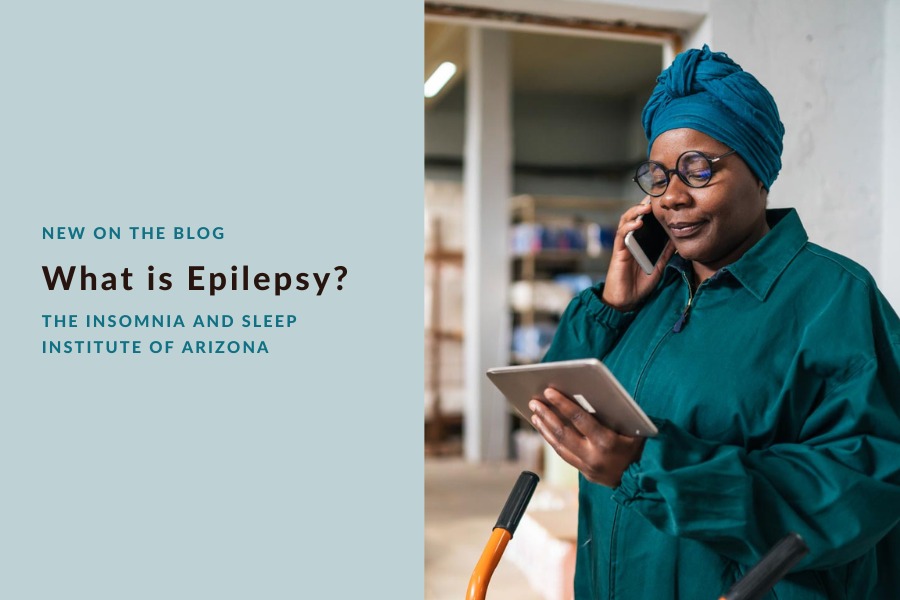Epilepsy and sleep disturbances have a well-documented relationship. At The Insomnia and Sleep Institute of Arizona, Dr. Vimala Sravanthi Vajjala specializes in working with patients who have epilepsy, which is actually an umbrella term for over 30 unique disorders. “Epilepsy” refers to abnormal brain activity that predisposes a person to a higher risk of seizures. It is estimated that axround 1 in 26 people in the US have some form of epilepsy, and it is one of the most common neurological disorders.
When it comes to epilepsy and sleep, the two have a bidirectional relationship. This means that when you don’t get enough quality sleep, you’re more likely to have an epileptic seizure. Of course, when you are experiencing seizures (or fearful of one occurring), that is going to make you have trouble falling asleep. Knowing more about your epilepsy can be helpful—but it is also important to work with a sleep expert who understands this complex relationship.
How Epilepsy Works
The brain has nerve cells that “talk” via electrical impulses. These impulses move through the body via chemical messengers (neurotransmitters). In most cases, electrical activity in the brain is pretty orderly. However, for those with epilepsy, the electrical activity and resulting connections are abnormal. This can cause bursts of electrical activity that can affect your feelings, thoughts, and actions. It has long been known that “nocturnal seizures” most often occur right when a person is falling asleep or waking up.
Sleep has become a key tool in diagnosing epilepsy, but we still have a long way to go in seeing how sleep impacts the frequency and time of epileptic seizures. Doctors diagnose epilepsy when a person has had two or more seizures (unprovoked) with at least 24 hours between the episodes. Sometimes epileptic seizures are connected to brain injuries, certain medical conditions, abnormal brain development, or a genetic condition. However, in the vast majority of cases, the cause of epilepsy is unknown. During an epilepsy evaluation, an electroencephalogram (EEG) is used to find the location of any abnormal brain activity. This lets your doctor know if the activity is in a small part of the brain or throughout it. Patterns of brain activity are also identified.
Sleep and Epilepsy
Abnormalities are more common during phases of sleep, particularly in stages that do not include REM. This means that, oftentimes, patients are requested to fall asleep during part of an EEG. Although a seizure can happen at any time of day or night, 20 percent of people have a seizure while sleeping. Another 40 percent have seizures while awake. Approximately 35 percent of people have seizures both while awake and asleep. A popular theory about the link between seizures and sleep is that the electrical activity in different areas of the brain typically synchronizes during NREM sleep (non-REM sleep). When there is too much syncing happening at this time, a seizure might occur. Other theories focus on how circadian rhythms and melatonin production might affect seizures.
Of the many types of epilepsy, some are more common during sleep. This includes nocturnal frontal lobe epilepsy, or NFLE, in which almost all seizures happen during NREM sleep. It can begin at any age, but usually starts in childhood. Those who have this type of seizure may not be aware of it when they wake up. Benign epilepsy with centrotemporal spikes (BECTS) is the most common kind of epilepsy diagnosed in children, and 70 percent of these seizures occur either right before falling asleep, during sleep, or while waking up.
Finally, Panayiotopoulos syndrome is a form of epilepsy most common in young children. Around 70 percent of these seizures occur while asleep and 13 percent happen upon waking. The good news with this type of epilepsy is that children usually “grow out of it” while having less than five seizures. Other, but less common, forms of epilepsy that mostly occur while asleep include Lennox-Gastaut syndrome, epilepsy with continuous spike-wave sleep, and autosomal dominant nocturnal frontal lobe epilepsy.
Help with Sleep and Epilepsy
Given the bidirectional relationship, it’s important to get enough quality sleep in order to lower your odds of a seizure. We can help. Schedule a consultation with Dr. Vimala Sravanthi Vajjala by calling The Insomnia and Sleep Institute office or completing the online contact form now.





